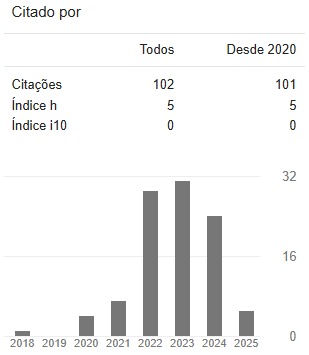Nós x eles: ensaio sobre estigma na atualidade
DOI:
https://doi.org/10.35642/rm.v8i1.1402Palavras-chave:
Discriminação, Segregação, PertencimentoResumo
A atual discussão sobre a problemática do bastardo acaba por igualar todas as formas de estigmatização, porém, apesar de os indivíduos estigmatizados apresentarem grande heterogeneidade entre si, todos trazem em comum certas características, sobre as quais o ensaio discorre. Tendo como base a questão do estigma enquanto desvio da norma, aborda-se a perspectiva da “diferença”, que supostamente afasta os indivíduos estigmatizados dos demais (igualando todas as formas de estigmatização), e a perspectiva da “semelhança”, que permite que as minorias se aproximem, na busca comum por organizar vozes a fim de debelar a exclusão e conquistar um objetivo compartilhado: o pertencimento. Argumenta-se que o estigma, além de meio concreto de materialização da dominação por meio da segregação, é também máquina de identidade coletiva potente, pois é determinante no processo de elaborar as características destacadas. Reflete-se ainda sobre a necessidade de combate à estigmatização, discutindo-se possíveis estratégias de enfrentamento.
Downloads
Referências
AINLAY, Stephen; COLEMAN, Lerita; BECKER, Gaylene (Eds.). The Dilemma of Difference: A Multidisciplinary View of Stigma. New York: Plenum, 1986. p. 1-13.
ANTONSICH, Marco. Searching for Belonging – An Analytical Framework. Geography Compass, v. 4, n. 6, pg 644-659, 2010. DOI: https://doi.org/10.1111/j.1749-8198.2009.00317.x.
BECKER, Howard. Outsiders: estudo da sociologia do desvio. Rio de Janeiro: Zahar; 2008.
CHAPMAN, Tracy. Fast Car. Single do álbum “Talkin’ about revolution”, 1988.
CORRIGAN, Patrick; WASSEL, Abigail. Understanding and influencing the stigma of mental illness. J Psycho Nurs Ment Health Service, v. 46, n.1, pg 42-48, 2008. DOI: https://doi.org/10.3928/02793695-20080101-04.
CORRIGAN, Patrick; WATSON, Amy. Understanding the impact of stigma on people with mental illness. World Psychiatry, v.1, n.1., pg 16-20, 2002. Disponível em: https://www.ncbi.nlm.nih.gov/pmc/articles/PMC1489832/. Acesso em: 10/07/24.
DIONEI, Mathias. Pertencimento: discussão teórica. Alea, v. 25, n. 1, p. 166-187, 2023. Disponível em: https://doi.org/10.1590/1517-106X/202325110. Acesso em: 20 ago. 2024.
DURKHEIM, Emile. The Rules of Sociological Method. New York: The Free Press, 1982.
EIGUER, Alberto. O estigma e o ódio contra si mesmo. Rev. Brasileira de psicanálise, v.53, n.1, p.19-31, 2019. Disponível em: http://pepsic.bvsalud.org/pdf/rbp/v53n1/v53n1a03.pdf. Acesso em: 10/07/24.
ELIAS, Norbert; SCOTSON, John. Os estabelecidos e os outsiders: Sociologia das relações de poder a partir de uma pequena comunidade. Ed. Zahar, 2000.
FAST Car. Intérprete: Tracy Chapman. Compositora: Tracy Chapman. In: TALKIN’ about revolution. Intérprete: Tracy Chapman. [S. l.]: Elektra Records, 1988. 1 CD.
FREITAS, Marina; ÉSTHER, Angelo; SANTOS, Joelma. Diversidade, estigmatização e pertencimento no contexto universitário. Caderno de Pesquisa, v. 53, 2023. DOI: https://doi.org/10.1590/198053149940.
FREUD, Sigmund. O mal-estar na civilização. São Paulo: Companhia das Letras, 2013.
GODOI, Alcinda; GARRAFA, Volnei. Leitura bioética do princípio de não discriminação e não estigmatização. Saude Soc, v. 23, n. 1, 2014. DOI: https://doi.org/10.1590/S0104-12902014000100012
GOFFMAN, Erving. Estigma: notas sobre a manipulação da identidade deteriorada. Rio de Janeiro: Zahar, 1980.
GOUVEIA, Valdinei. Introdução à teoria funcionalista dos valores. In: GOUVEIA, Valdinei (Ed.), Teoria funcionalista dos valores humanos: Áreas de estudo e aplicações. São Paulo: Vetor, 2016.
GOUVEIA, Valdinei; FONSECA, Patrícia; MILFONT, Taciano; FISCHER, Ronald. Valores humanos: contribuições e perspectivas teóricas. In: TORRES, C.V.; NEIVA, E.R. (Eds.), Psicologia social: Principais temas e vertentes. Porto Alegre: ArtMed, 2011.
LAPLANCHE, Jean; PONTALIS, Jean-Bertrand. Vocabulaire de la psychanalyse. Paris: PUF, 1967.
MACHADO, Paula. Resiliência familiar: a experiência dos casais homoafetivos face aos desafios da parentalidade. Dissertação (Mestrado em Família na Sociedade Contemporânea), Universidade Católica do Salvador: Salvador, 2023.
MELO, Kleber; MONTEIRO, Pedro. Discriminação e estigma na Declaração Universal sobre Bioética e Direitos Humanos. Rev Bioética, v. 29, n.4, pg 756-762, 2021. DOI: https://doi.org/10.1590/1983-80422021294509.
OLIVEN, Arabela. Ações afirmativas nas universidades brasileiras: Uma questão política, um desafio pedagógico. In: Franco, M. E. D. P.; Krahe, E. D. (Orgs.). Pedagogia universitária e áreas de conhecimento. RIES/PRONEX: EdiPucrs, 2007.
PENNINGS, Guido. Evaluating the welfare of the child in same-sex families. Human Reproduction, v. 26, n. 7, p. 1609-1615, 2011. DOI: https://doi.org/10.1093/humrep/der109
SANT’ANNA, Fernanda. A dor sedimentosa e a catástrofe do existir: bastardia, desamparo e angústia em Frankstein de Mary Shelley. Anais do XV ABRALIC, 2016.
SILVA, Elder. A transformação do estigma em orgulho: redes de sociabilidade LGBT na Universidade Federal do Recôncavo da Bahia. Rev. Estudos Universitários, v. 46, n. 2, pg 409-424, 2020. DOI: https://doi.org/10.22484/2177-5788.2020v46n2p409-424.
SIQUEIRA, Ranyella; CARDOSO, Hélio. O conceito de estigma como processo social: uma aproximação teórica a partir da literatura norte-americana. Imagonautas, v.2, n.1, 2011. Disponível em: http://acervodigital.unesp.br/handle/11449/127032. Acesso em: 10/07/24.
VERHAEGHE, Mieke; BRACKE, Piet; BRUYNOOGHE, Kevin. Stigmatization and self-steem of persons in recovery from mental illness: the role of peer support. Int J Soc Psychiatry, v. 54, n.3, pg 206-218, 2008. DOI: https://doi.org/10.1177/0020764008090422.
VIANNA, Claudia. O movimento LGBT e as políticas de educação de gênero e diversidade sexual: Perdas, ganhos e desafios. Educação e Pesquisa, v. 41, n.3, pg 791-806, 2015. DOI: https://doi.org/10.1590/s1517-97022015031914.
WACQUANT, Loic. Que é gueto? Construindo um conceito sociológico. Rev Sociol Polit, v. 23, pg 155-164, 2004. DOI: https://doi.org/10.1590/S0104-44782004000200014.
WATSON, Amy; CORRIGAN, Patrick; LARSON, Jonathon; SELLS, Molly. Self-stigma in people with mental illness. Schizophrenia Bulletin, v.33, n.6, pg 1312-1318, 2007. DOI: https://doi.org/10.1093/schbul/sbl076.
Downloads
Publicado
Edição
Seção
Licença
Copyright (c) 2024 Revista Macambira

Este trabalho está licenciado sob uma licença Creative Commons Attribution 4.0 International License.












